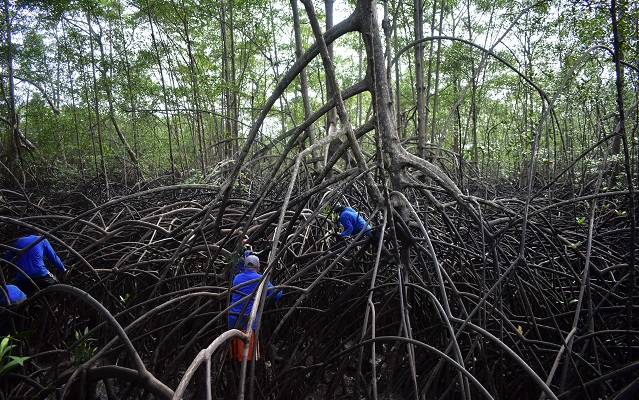Community-based strategies for the conservation of mangroves and improvement of rural livelihoods

Mangroves are powerful carbon sinks. They can store carbon dioxide in their roots, branches, and sediments. They store up to ten times more carbon than other forests. Along the Colombian Pacific coast, existing mangrove ecosystems have become increasingly under pressure due to the expansion of agriculture, timber industry, urbanization, and the impact of climate change. This IKI Small Grants project strengthens four community councils in Timbiquí, Santa Barbara de Iscuandé, and La Tola to successfully implement their community-based environmental management strategies that contribute to the conservation of mangroves and the diversification of rural livelihoods. With 2,000 hectares of protected mangroves, the project contributes to the preservation of natural carbon sinks.
INITIAL SITUATION
The Colombian Pacific coast, including the target municipalities of Timbiquí, Santa Barbara de Iscuandé, and La Tola, has the second highest coverage of 194,000 hectares of mangroves worldwide, with a wide range of species. It is located within the Tumbes-Chocó-Magdalena biodiversity hotspot. 70 per cent of the mangroves of the target region are protected by local communities, whereas 30 per cent belong to the Nature Park ‘Sanquianga’. The mangrove ecosystem has become increasingly under pressure due to the expansion of agriculture, timber industry, urbanization, and the impact of climate change.
Furthermore, the approximate 7,500 inhabitants of the three municipalities are suffering from a lack of education, work opportunities, infrastructure, and transportation, resulting in a multidimensional poverty rate above 80 per cent.
TARGET GROUP
The project targets 1,226 direct beneficiaries and 7,500 indirect beneficiaries in four community councils from three municipalities. It focuses on specific rural areas that are highly vulnerable. The entire target population is Afro-Colombian. 80 per cent of the inhabitants are working in the informal sector, mainly in agriculture, traditional fishing, shell collection, and commerce. Their economic activities depend on the seasons and periods when fishing is authorized. Consequently, the average monthly income is below the current legal minimum wage. 80 per cent of the inhabitants suffer from unsatisfied basic needs.
APPROACH AND ACTIVITIES
This IKI Small Grants project promotes the protection and sustainable use of mangroves. The project thus contributes to climate protection and income generation for local communities. Its objective is to strengthen four community councils in the South Pacific of Colombia to successfully implement their community-based environmental management strategies. On top of that, 2,000 hectares of mangroves are protected.
The project activities include the establishment of hatcheries for native tree and seashell species, data collection through an online application, interactive workshops on several environmental topics, as well as dialogue meetings with relevant authorities and the private sector to discuss community-based strategies and partnership development.
Furthermore, a community-based, regional concept paper on the sustainable and economic use of the mangroves is drafted. The sustainability of the project is ensured through a participatory community development approach as well as integrated information and knowledge management, including the publication and dissemination of learning experiences and good practices.
CAPACITY DEVELOPMENT
IKI Small Grants supports Fundación A-kasa in their organisational capacity development through:
- Elaborating an environmental sustainability plan to improve A-kasa staff environmental practices in the office and in the field
- Improving the impact framework of A-kasa with a matrix of SMART indicators
- Strengthening the field safety protocol of the Foundation
ABOUT THE ORGANISATION
Fundación A-kasa is a local NGO that focuses on sustainable development, protection, inclusion, assistance, and promotion of the rights of vulnerable populations in 18 departments in Colombia.
